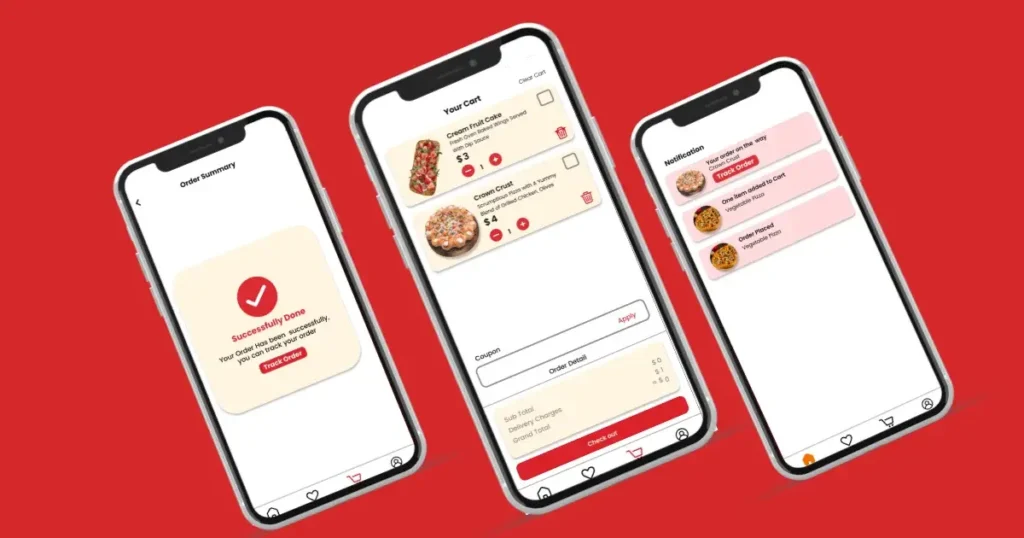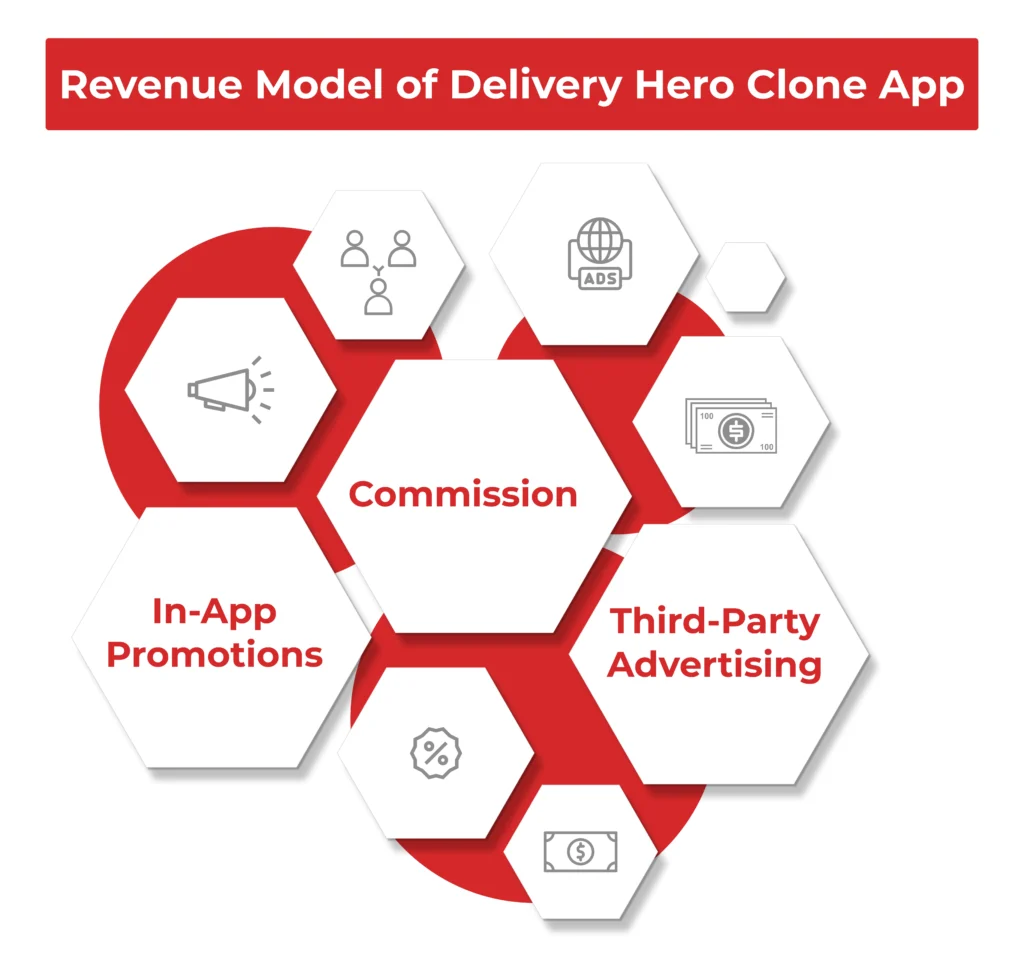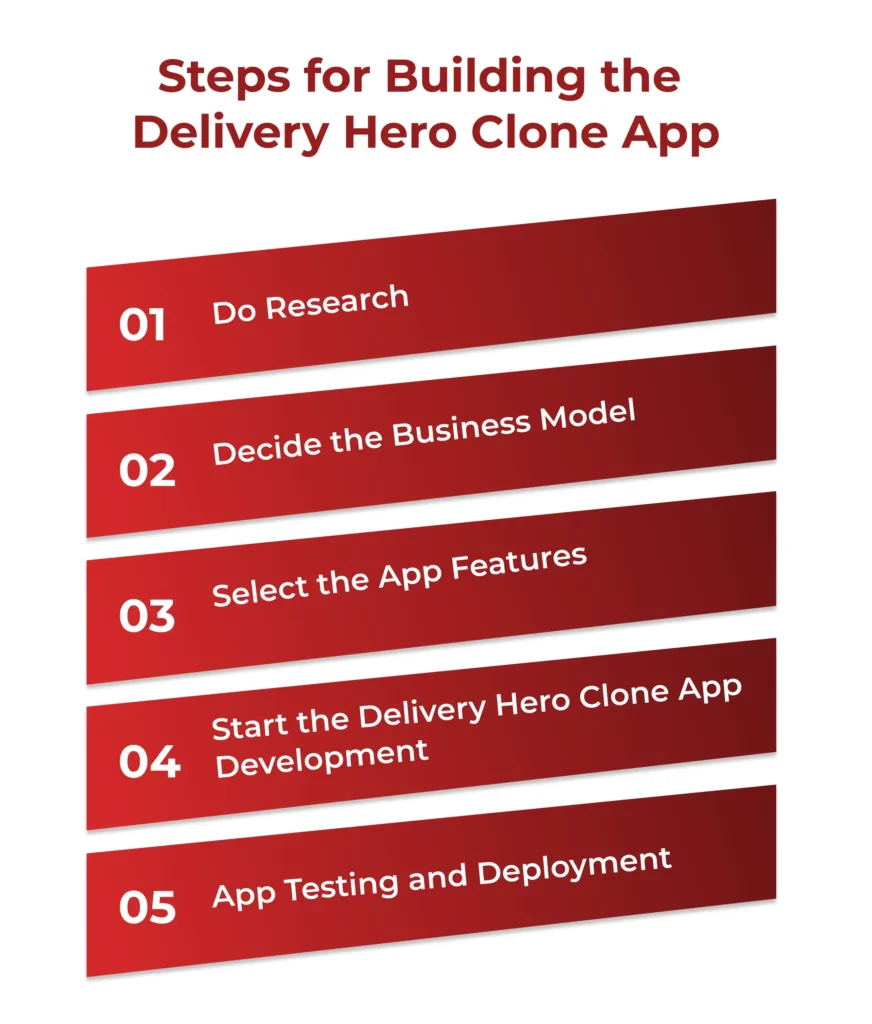
Key Takeaways
- Launch a multi-delivery app like Delivery Hero in just 7 days.
- Supports food, grocery, and other on-demand services.
- Includes customer, restaurant, and rider apps with real-time tracking.
- Earn via commissions, ads, and in-app promotions.
- Built with a scalable and secure tech stack.
Are you planning to start your online delivery business like Delivery Hero? Create a customized app that includes all the features you need to start an online business and help boost your revenue. With the Delivery Hero clone app, you can deliver food, groceries, and other products to your customers’ doorsteps without hassle.
When you have launched your Delivery Hero app clone, you can easily gain new customers and serve your customers exactly what they demand. Keeping track of your business growth, gaining massive profits, and retaining profits is possible with just a white-label food delivery app.
From startups to well-established businesses, creating an on-demand food delivery platform similar to Delivery Hero is the path to success. So, create it for your customers and business by following our detailed guide.
What is a Delivery Hero Clone?
The Delivery Hero clone app is an online food ordering and delivery platform. It replicates the features and functionalities of the original platform with more advanced and unique features that help to rapidly establish the food delivery platform.
The main aim of creating the Delivery Hero app clone is to:
- Help the food delivery service providers improve their operations and boost profits.
- Help you streamline your food delivery operations.
- Help you meet the high demands of customers.
- Help you grow your business online.
Moreover, the Delivery Hero clone script is the perfect solution to meet the changing demands of the food delivery industry. It is a win-win solution for both food delivery businesses and customers.
Supercharge your deliveries with Enatega.
Register NowWorkflow of Delivery Hero Clone App
How does the Delivery Hero clone app work?
For building a great food delivery clone app, knowing the workflow is crucial. It helps to provide a roadmap, guiding you through each stage of food delivery app development, from ideation to deployment.
Below is the Delivery Hero app clone workflow to help you build a great app.
- Users browse the nearby restaurants and stores. Choose the items to place an order.
- The restaurants/stores get a notification of the user’s requests and process the order.
- After preparing the order, restaurants/stores assign the food to the nearest rider.
- The riders get notified of the delivery request. They have the option to accept or reject the request according to their availability.
- When the rider accepts the request, they pick up the order from the restaurant/store and deliver it to the customer’s location.
- After receiving the order, customers provide feedback and ratings based on their overall experience.
Revenue Model of Delivery Hero Clone App
How do you make money with a Delivery Hero clone app?
The below-mentioned revenue models of the Delivery Hero app clone help you earn more sales and revenue.

Commission
In this revenue model, businesses earn a percentage of the total value of each transaction that occurs through their platform. This percentage, known as the commission, is typically a fixed rate based on factors like the transaction volume or the type of product or service being sold.
Third-Party Advertising
Businesses charge fees from third-party businesses for promoting their products on their platform. This can take many forms, including banner ads, sponsored content, and targeted advertising.
In-App Promotions
The in-app promotions revenue model is a powerful way to drive restaurant sales and generate revenue for your Delivery Hero app clone. This model involves promoting restaurants directly within your app, showcasing their offerings, and enticing users to place orders.
Key Food Delivery Statistics
- According to Business of Apps, the entire food delivery app industry is expected to reach $213 billion market size by 2030.
- In the online food delivery market, the United States boasted an estimated 353 billion U.S. dollars in revenues in 2024, according to Statista.
- In Canada, 27% of the general population has ordered delivery twice in one day.
- 27% of US consumers, 28% of Canadians, and 29% of Australians say they plan meals days in advance.
Benefits of Creating the Delivery Hero Clone App
Building the Delivery Hero app clone helps you run your food delivery business easily. It is a complete package for businesses and customers and provides several benefits to them.
Let’s explore the benefits that businesses and customers get from the white-label Delivery Hero clone app.
| Benefits for Businesses | Benefits for Customers |
| Using a customizable food delivery clone script can boost your brand awareness and expand your customer base. By offering a user-friendly platform for ordering food, you become more visible to potential customers who are actively searching for delivery options. This increased visibility translates to more opportunities to attract new customers and build brand recognition. | Customers can access a wide range of restaurants and cuisines on the clone app. From the single platform, customers get access to a diverse selection of culinary experiences, catering to various tastes and preferences. Whether it’s a quick bite, a gourmet meal, or a specific ethnic cuisine, the app offers a convenient solution for all their food delivery needs. |
| Restaurants can easily update their menus, manage inventory levels, and track order statuses in real time, ensuring accurate and timely fulfillment. The app also provides tools for managing riders, including assigning orders, tracking their locations, and communicating with them directly. This centralized platform simplifies order management, reduces errors, and optimizes delivery efficiency, contributing to a seamless and reliable experience for both restaurants and customers. | A food clone app streamlines the entire ordering process, making it easier and faster for customers to get their food. With the app, customers can place orders, track their delivery in real time, and receive their food quickly and efficiently. This streamlined experience reduces wait times, minimizes errors, and ensures a smooth and satisfying delivery process for everyone involved. |
| The food clone script incorporates features that reward loyal customers and encourage repeat orders that help build long-term relationships with users. | The app prioritizes transparency and peace of mind about their orders, providing real-time tracking, order updates, and clear communication with both restaurants and delivery drivers. |
| Businesses can save their time and effort in hiring staff for multiple tasks, such as receiving orders on phone calls, which can now be done automatically with the food clone app. | The app offers multiple payment options for easy transactions, ensuring a smooth and convenient experience for customers. From popular digital wallets to credit and debit cards, users can select their preferred method for paying for their orders. |
| It is one of the best benefits of a food delivery app. Having readily available customer support helps build trust and loyalty, as users feel confident that their concerns will be addressed promptly. This dedicated support also helps to improve user satisfaction and minimize negative feedback, creating a more positive experience for everyone. | A ready-made Delivery Hero clone app often includes a dedicated customer support feature, providing a direct channel for users to resolve queries and address issues. This can be in the form of an in-app chat, email support, or a phone call. |
| The app enables delivery businesses to launch targeted marketing campaigns to attract new customers and expand their reach. By using user data and demographics, businesses can tailor their marketing messages to specific customer segments and increase engagement and conversions. | The Delivery Hero clone script app provides access to exclusive deals, discounts, and promotions, allowing customers to enjoy significant savings on their food orders. |
| The Delivery Hero app clone provides tools for communication between riders and customers, allowing for order updates and potential delivery delays to be communicated seamlessly. | The clone food app uses personalized recommendations based on user preferences and creates a tailored experience for each user. By analyzing past orders, browsing history, and user ratings, the app suggests restaurants and dishes that align with their tastes. |
Key Features of the Delivery Hero Clone App
Building a clone app like Delivery Hero offers similar and advanced features to customers and businesses. A successful app contains the customer, restaurant, rider, and an admin dashboard.
Let’s check out some key features of each app that will be vital for developing a multi-delivery app like Delivery Hero.
| Customer App | Restaurant App | Rider App | Admin Dashboard |
| User login/registration | Restaurant login | Rider login | Admin login |
| Order tracking | Menu management | Accept/reject order | Customer management |
| Browse restaurants/stores | Notifications/alerts | In-app call/chat | Restaurant management |
| Ratings and reviews | Replies to user reviews | Track earnings | Analytics and report |
| In-app chat | Accept/reject order | Order history | Rider management |
| Group ordering | Order status (pending, delivered, canceled) | Delivery information | |
| Advanced search and filter | Price management | ||
| Apply coupons and discounts | Stock management | ||
| Multiple payment options | Offers and discount management | ||
| Contactless delivery option | The order is assigned to the rider | ||
| Multiple languages |
Tech Stack for Building the Delivery Hero Clone App
Building the food delivery app clone involves several tools and technologies. It requires a combination of front-end and back-end development technologies. Here are the main technologies used to create a Delivery Hero app clone.
| Category | Technologies | Description |
| Frontend | ||
| Framework | React Native, Flutter, Ionic | Cross-platform frameworks for building native-like mobile apps |
| UI Library | Material Design (Android), Cupertino (iOS), React Native Elements/NativeBase | UI components for a consistent look and feel across platforms |
| Navigation | React Navigation (React Native), Flutter Navigation, Ionic Navigation | Handle navigation between screens and views within the app |
| API Integration | Axios, Fetch API | Make HTTP requests to communicate with the backend API |
| Testing | Jest, Enzyme (React Native), Flutter Test | Write unit tests to ensure code quality and functionality |
| Backend (API & Infrastructure) | ||
| Language | Node.js (Express.js), Python (Django/Flask), Java (Spring Boot) | Backend languages for building APIs and handling server-side logic |
| Database | PostgreSQL, MongoDB, Redis | Store and manage data for the application |
| Cloud Platform | AWS, Google Cloud Platform, Azure | Host and manage the backend infrastructure |
| API Gateway | AWS API Gateway, Google Cloud Endpoints, Azure API Management | Manage API requests and responses, provide security, and analytics |
| Authentication & Authorization | JWT, OAuth 2.0 | Securely authenticate users and control access to resources |
| Payment Gateway | Stripe, PayPal, Square | Process payments for orders |
| Messaging Queue | Amazon SQS, Google Cloud Pub/Sub, Azure Service Bus | Facilitate asynchronous communication between different parts of the application |
| Additional Considerations | ||
| Geolocation | Google Maps, Mapbox | Provide location-based services like order tracking |
| Push Notifications | Firebase Cloud Messaging | Send notifications to users and delivery partners |
| Real-time Updates | WebSockets, Socket.IO | Enable real-time features like live order tracking |
| Security | HTTPS, authentication, authorization | Protect user data and prevent fraud |
Steps for Building the Delivery Hero Clone App
Developing the app like Delivery Hero involves some steps, such as:

1. Do Research
First, you have to identify the main business goal that you want to achieve. Then, do market research and understand the user needs, the latest market trends, and competitors’ apps’ strengths and weaknesses. With surveys, group interviews, desk research, or focus groups, you can gather information.
With this information, you can easily create a unique app that helps you stand out in the crowded market.
2. Decide on the Business Model
In this phase, select the business model according to your requirements. Your company’s profits depend on your business model, and it defines how the products or services will sell to the target market.
3. Select the App Features
After doing all the research and selecting the business model, identify the app features. Always add the relevant features by keeping your target users’ interests in mind. Add those features that are missing in your competitor’s app.
4. Start the Delivery Hero Clone App Development
Now, start the app development phase. It is the core process of developing an app. This phase consists of three phases:
- First, you have to design the UI/UX. The app design should be simple and keep your brand identity unique. Add visual elements and make it more attractive.
- In the frontend development, build the app interface, ensuring that users can navigate and interact with the app easily.
- Now, start the backend development. It is the application’s support structure and focuses on implementing the main app functionality.
5. App Testing and Deployment
When the app development phase is complete, start the testing phase. It is an integral part of the app development process. In this phase, test the app and remove all the errors and bugs. Make the app error-free and then deploy it on the Apple App Store or Google Play Store.
Cost of Building the Delivery Hero App Clone
The actual cost of food clone app development may vary and depend on the specific features, complexity, development team chosen, and your app requirements.
However, we’ve gathered some information that shows a rough estimate of the cost of developing the clone app.
| Feature/Component | Estimated Cost (USD) |
| Core Development | |
| Backend development | $10,000 – $50,000 |
| Frontend development | $10,000 – $50,000 |
| Database design and implementation | $5,000 – $20,000 |
| API development | $5,000 – $20,000 |
| Payment integration | $2,000 – $10,000 |
| Delivery management system | $5,000 – $20,000 |
| Features | |
| Real-time updates | $5,000 – $15,000 |
| In-app chat | $3,000 – $10,000 |
| Loyalty programs | $5,000 – $15,000 |
| Restaurant analytics | $5,000 – $15,000 |
| Advanced search filters | $3,000 – $10,000 |
| Design and UI/UX | |
| UI/UX design | $5,000 – $20,000 |
| Branding and logo design | $2,000 – $8,000 |
| Deployment and Maintenance | |
| App Store submission | $100 – $500 |
| Hosting and server costs | $500 – $2,000 per month |
| Ongoing maintenance and updates | $500 – $2,000 per month |
| Total Estimated Cost | $50,000 – $250,000+ |
Challenges for Building the Delivery Hero Clone App
Building a Delivery Hero clone app involves several challenges that can impact its development and success.
Let’s some key challenges and their solutions.
| Challenge | Solution |
| Market Research and Competition: Understanding user needs and identifying competitors is crucial. | To tackle this challenge, conduct surveys and focus groups to gather information directly from potential users about their preferences and expectations. Perform a competitive analysis to evaluate existing competitors, identifying their strengths and weaknesses to find your unique value proposition. |
| User Experience (UX) Design: Creating an intuitive and user-friendly interface can be complex. | To address this, adopt a user-centered design approach by involving actual users in the design process with wireframes and prototypes using tools like Figma or Sketch. Implement A/B testing to compare different design elements and determine which configurations attract the best with users. |
| Payment Integration: Supporting multiple payment methods securely is vital for user trust. | Integrate trusted payment gateways like Stripe or PayPal, which offer strong security features to protect user data during transactions. |
| Restaurant Partnerships: Onboarding restaurants while maintaining service quality can be challenging. | To better maintain this process, create an easy-to-use platform that simplifies restaurant sign-up and profile management. Implement regular quality checks through user feedback to monitor restaurant performance and ensure high standards of food and service. |
| Customer Support: Providing responsive and effective customer service is important for user satisfaction. | Develop a multi-channel support system that includes chat, email, and phone options to cater to diverse user preferences. Implement AI-driven chatbots to offer 24/7 assistance for common inquiries, ensuring users receive timely support. |
FAQs
1. Is Delivery Hero in the USA?
Delivery Hero does not operate directly in the USA. Instead, it has focused on markets in Europe, Asia, and the Middle East. In the U.S., there are other prominent food delivery services like DoorDash, Uber Eats, and Grubhub.
2. How long does it take to develop a Delivery Hero clone app?
The development timeline can vary based on the complexity and features required. However, with a ready-made script, businesses can launch their platform in as little as one week.
3. How does a Delivery Hero make money?
Delivery Hero generates revenue through several key channels, such as:
- Commission fees
- Delivery fees
- Subscription services
- Advertising
- Partnerships and logistics
4. What companies are under Delivery Hero?
Delivery Hero operates several brands, including Foodpanda, Pedidos Ya, and Talabat, among others, across various international markets.
5. Is Delivery Hero a marketplace?
Yes, Delivery Hero functions as a marketplace that connects customers with restaurants and food providers for delivery and takeout services.
6. What nationality is Delivery Hero?
Delivery Hero was founded in 2011 in Berlin, Germany. It has grown to become a leading global online food delivery service, operating in numerous countries across Europe, Asia, the Middle East, and Africa.
7. Who are Delivery Hero’s competitors?
Delivery Hero’s main competitors are:
- Uber Eats
- DoorDash
- Just Eat Takeaway
- Deliveroo
8. Is Glovo under Delivery Hero?
Yes, Glovo is majority-owned by Delivery Hero. Since mid-2022, Delivery Hero, the German delivery company, has acquired a controlling stake (around 94% ownership) in Glovo, making Glovo part of the Delivery Hero group while still operating under its own brand.
9. Is HungerStation owned by Delivery Hero?
Yes, HungerStation is owned by Delivery Hero. In 2023, Delivery Hero acquired the remaining minority shares of HungerStation, giving it full ownership of the Saudi Arabia–based food and delivery platform as part of its global delivery business.
10. Where is the Delivery Hero headquarters?
Delivery Hero is headquartered in Berlin, Germany, with its main corporate office located in the Mitte district on Oranienburger Straße.
Supercharge your deliveries with Enatega.
Register NowConclusion
Creating the Delivery Hero clone app is your chance to enter the food delivery market with confidence. It transforms your online food delivery business, maximizes your business reach, and generates high returns in a short period.
Need to create a food delivery app that becomes the market leader? Consult Enatega. We create an app according to your requirements that increases conversion and retention rates. Our experts have developed more than 100+ food apps like
Grubhub clone, Postmates clone, etc that help businesses to succeed in the market.
Book a free demo with us and get the best food clone app cost-effectively.















 IOS
IOS Android
Android Web
Web




